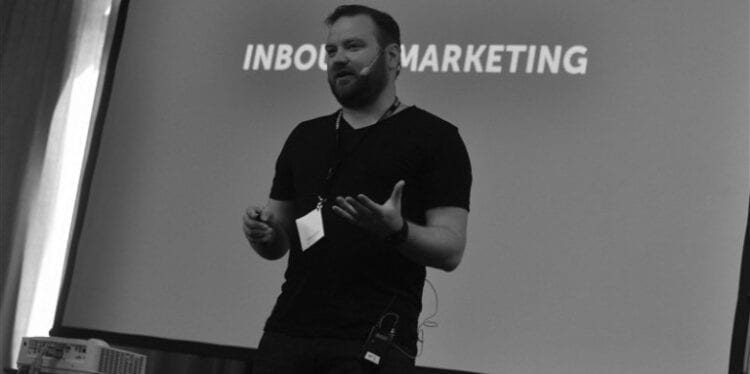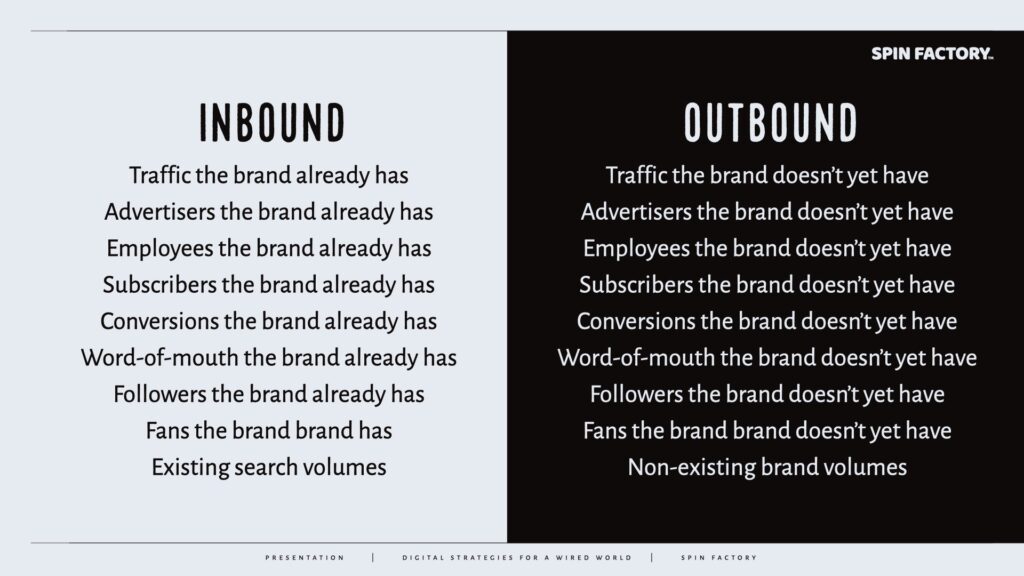Your content is not marketing.
If you’re a PR or communication professional like me, creating online content for brand channels is an everyday concern. Stakeholders need content; influencers need content; the publics need content.
It’s a never-ending story, but it’s also fun. Most importantly, it’s necessary for a digital-first society.
But the marketing part… makes it less effective. And less fun.
I’ve been professionally creating online content for 18+ years, and I find the marketing part of content marketing to be one of the stupidest ideas in corporate communication.
Why?
Keep reading to learn how to turn content marketing into content communications and get better results from your digital PR efforts.
Here we go:
The Confused State of Content Marketing
We live our lives on the Money Web now. I’m not against people making a living, but I’ve never seen the point of blurring the lines between advertising and editorials. Yes, I’m old-school PR; trust must be earned. Then you sell.
But anywhere you turn online, there’s content marketing. Everyone’s trying to sell you something. Stone-cold sales pitches are masquerading as editorial content. Back in the day, we used to frown at such practices.
Do you think I’m exaggerating? Email’s nearly destroyed by content marketing. The lines between editorial content and advertising emails are so blurred that keeping your inbox free from all the solicitation is almost impossible.
Worst case scenario? We won’t be able to communicate with each other via publicly available digital channels since all trust will have been eroded so completely by aggressive marketing tactics on autopilot.
There will be ways around this for individual users by only allowing approved senders — and keeping contact details secret. But this will spell disaster for those of us who make a living from reaching out to audiences on behalf of organisations.
Content is the Future of Practical PR
I’ve discussed the issue of muddling the boundaries of marketing and communication with many marketers. But they don’t see a problem; what could be better if advertising can be conveyed as editorial content, they insist. And if this practice negatively impacts editorial practices — what do they care?
But marketers aren’t the problem here: Marketers should do marketing. Marketing should push products and services. Via sales, marketing makes our society go around; it funds our salaries, institutions, and progress. The problem is us — the communicators of the world.
Communication departments have continuously operated on a fraction of the budgets of marketing departments. PR agencies have always stood in the shadow of the mighty advertising industry. But this is a remnant of a century with traditional mass media. In our digital-first society, trust is the major challenge. And you build trust with communication, not marketing.
So, the world’s communicators have an essential role in organisations. We must communicate to establish trust and maintain good external and internal relationships. But we can’t turn to marketing (or anyone else) for help. We’re the experts; we have the tools needed.
In short: It’s up to us, not others.
Communication is indeed a smaller industry than marketing. We live in a society where everyone wants to sell their products and services to make a living. That’s fine. But communication is essential, too. And being a minor discipline, we must fight harder to prove our importance.
Content is Not Marketing
With the risk of sounding ancient, I remember when producing in-house editorial content was a low-status specialisation in communications. These PR specialists produced magazines for employees, partners, and customers. I thought that editorial content deserved a higher status then and surely deserves higher status in communications now.
But instead of thinking about defeat or lack of success, I don’t mind being the underdog, the smart minority. We have less to lose and more to win.
I predict that advertising will have to find new ways to persuade. They can’t keep pushing aggressively in every digital channel forever. In the meantime, two-way communication, building trust, and establishing relationships will only grow in importance.
The communication industry is perfectly equipped to tackle today’s and tomorrow’s digital communication challenges. In the future, content marketing and content communications can co-exist.
If you work in a communications department today, you’re likely already responsible for the organisation’s websites, apps, newsletters, and social media channels. Because marketing doesn’t want to run channels, it wants to run campaigns. As communicators, we must step up and lead the way.
The Red Bull Content Machine
When I think of content, I think of Red Bull. Red Bull is objectively just one sports drink among many. What sports, in general, have to do with carbohydrate drinks, I don’t know. But there’s nothing special about its ingredients, flavours, or packaging.
Red Bull could, of course, take the route of traditional marketing. “Here’s our sports drink, Red Bull. It’s awesome. Buy it, and you can be awesome, too. Look at these slick visuals of backlighted cans sprayed misty for your viewing pleasure.”
Instead, Red Bull has opted for editorial content that’s worth watching. Not only are they producing content that the extreme sports community loves, but they’re also sponsoring their passions, allowing them to pursue their dreams. I don’t know how they came up with the strategy, but we can all see that it’s different from traditional advertising.
It takes editorial bravery to produce content that people love, and it doesn’t take bravery to aggressively promote products and services. In this sense, Red Bull is a brave company.
Today, Red Bull is synonymous with the world of extreme sports. They’re the architects behind thousands of spectacular influencers who create content wearing their logo, and other competing brands must try to follow their lead.
Red Bull still does regular ads; they still sell energy drinks. But by focusing not just on marketing but on editorial communication, too, their brand has reached an iconic level in their niche.
Enter: Content Communications
Now, producing extreme sports videos was the route that Red Bull took. Regarding content, video is just one of many possible routes to take. Perhaps you’re working for a B2B IT company? Ask yourself: How do you produce content that B2B IT buyers would consume not just willingly — but eagerly?
Here’s a mindset for you to get started:
Will content communications ever be as big as content marketing? Probably not. Will people keep referring to content communications as content marketing? Yes, probably. However, we who have discovered this distinction can make it work in our favour.
Being the underdog has its advantages, too. 4Silfwer, J. (2016, August 25). The Stupid Majority PR Strategy: How Underdogs Dominate. Doctor Spin | The PR Blog. https://doctorspin.net/stupid-majority-pr-strategy/

THANKS FOR READING.
Need PR help? Hire me here.

PR Resource: Inbound vs Outbound
The Inbound Shift
As public relations professionals, we must rethink how we think about publics. Traditionally, many PR departments have argued:
“Why should we waste budgets on ‘already acquired’ audiences?”
The truth is — it’s the other way around.
The inbound shift is a fundamental mindset change in the public relations industry.

Instead of “spamming” non-existing audiences, public relations and marketing can do much more with existing online publics. 5Silfwer, J. (2015, June 11). The Publics in Public Relations. Doctor Spin | The PR Blog. https://doctorspin.net/publics-in-public-relations/
Inbound vs Outbound: The Difference
Inbound vs outbound is the online equivalent of drawing the line between those who know you and those who don’t.
Drawing a line between those who know you and those who don’t know you is nothing new:
If your inbound shift PR strategy is strong, you might no longer need to prioritise your outbound PR strategies since your inbound audience will attract outbound publics!
Learn more: The Inbound Shift PR Strategy
PR Resource: Free Content PR Course
Spin Academy | Online PR Courses

Spin’s PR School: Free Content PR Course
Unlock your potential with this Free Content PR Course. Learn effective digital public relations strategies and elevate your career to new heights today.
Content Communications
Content Management
Content Strategies
Learn more: All Free PR Courses
💡 Subscribe and get a free ebook on how to get better PR.

Annotations
| 1 | Silfwer, J. (2022, September 22). “For Content!” Doctor Spin | The PR Blog. https://doctorspin.net/for-content/ |
|---|---|
| 2 | Silfwer, J. (2012, April 13). The PESO Model: Paid, Earned, Shared, and Earned Media. Doctor Spin | The PR Blog. https://doctorspin.net/peso-model/ |
| 3 | Silfwer, J. (2016, May 25). The Follower Contract. Doctor Spin | The PR Blog. https://doctorspin.net/follower-contract/ |
| 4 | Silfwer, J. (2016, August 25). The Stupid Majority PR Strategy: How Underdogs Dominate. Doctor Spin | The PR Blog. https://doctorspin.net/stupid-majority-pr-strategy/ |
| 5 | Silfwer, J. (2015, June 11). The Publics in Public Relations. Doctor Spin | The PR Blog. https://doctorspin.net/publics-in-public-relations/ |



